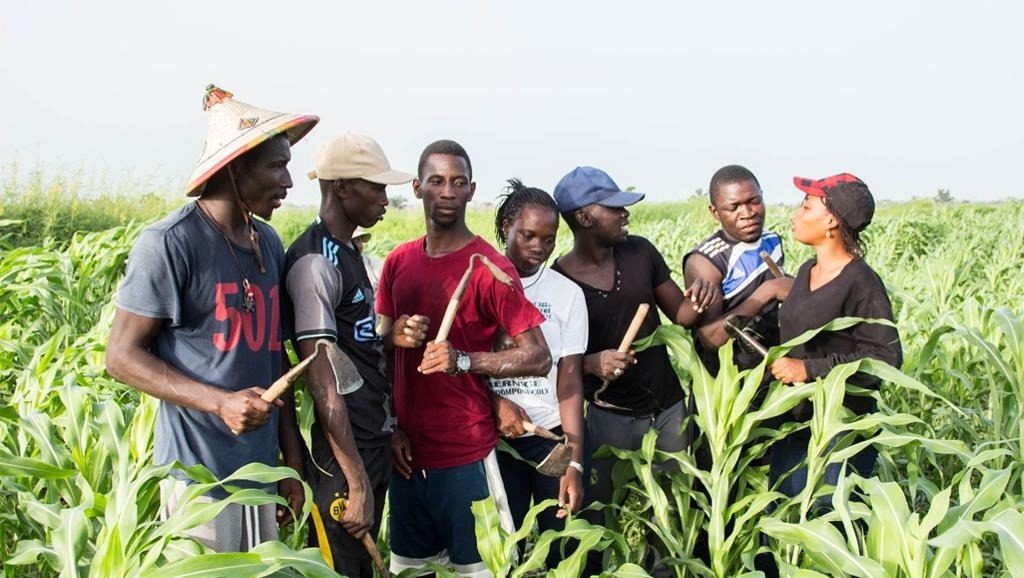Agents of change – How can countries empower rural youth to become successful entrepreneurs?

The challenge of the ‘youth bulge’
The global youth population is growing. Youth account for the largest share of the population in many countries. This phenomenon is often referred to as the ‘youth bulge’. It puts enormous pressure on governments to provide adequate education and employment opportunities. Global youth unemployment was estimated at 15.6 percent in 2021, significantly higher than for adults. Most youth in Africa and Asia still live in the countryside. In 2019, young people in rural areas around the globe were more likely to be in the labor force than their urban counterparts. The rural-urban gap in youth labor force participation is particularly high in Africa and low-income countries.
Ag sector can create youth entrepreneurship opportunities
The youth bulge also represents a demographic dividend. To harness this opportunity, it is essential to support professional growth and productive employment for young people. However, rural youth in developing countries often face poor working conditions, lack of access to quality education, and limited availability of key resources.
The agricultural sector employs a significant share of these countries’ rural populations. Sadly, informal jobs and low pay often discourage youth from participating. However, demand is rising for diverse and high value-added agricultural and food products. There is, therefore, considerable potential for integrating rural youth into productive and environmentally sustainable agribusiness activities. They can engage in entrepreneurial ventures because they tend to be better educated than previous generations, are receptive to new ideas and advanced technologies, and are keen to establish new kinds of enterprises.
Study points to challenges for young entrepreneurs
To analyze key drivers of youth entrepreneurship success, the *International Food Policy Research Institute (IFPRI) and the Syngenta Foundation ran a comparative study in Nigeria and Bangladesh. The study looks at four drivers of success. These are policy, institutional and technical support, and individual youth characteristics. The policy system supports and provides an enabling environment for youth engagement in entrepreneurial activities. Institutional support comes from the business sector. Technical support includes mobile technology and other infrastructure required for agribusiness success. The fourth driver is the individual motivation and skills of the youth initiating business ventures. The study also considered factors such as the involvement of youth in business opportunities and the technical and other knowledge needed to meet customer needs. This framework highlights the need to identify key stakeholders who can create and support entrepreneurial opportunities and design ways to expand the scale of young people’s businesses.
Supporting rural youth entrepreneurship requires forward-looking policy and investment. Government policies and strategies in many countries already promote youth employment and entrepreneurship. However, systematic translation of these strategies into investment and coordinated action remains limited. Entrepreneurship programs lack a systematic approach, operate in isolation, are often ad-hoc, remain project-driven, involve few stakeholders, and are poorly linked to other elements.
Several key challenges hamper young people’s ability to reach their full potential. These challenges are apparent at several levels: policy, institutional, technology, and infrastructure, as well as individual.
Improvements are needed in three main areas
A trio of recommendations emerges:
- Productivity: Young rural entrepreneurs find it hard to access advanced agricultural technology, finance, and land. These are all essential prerequisites for success. Facilitating access should therefore be a top priority of country support to rural youth. The efforts should include strengthening properly functioning land markets, particularly in the rental area.
- Skills: Vocational training should be geared towards entrepreneurial thinking, identifying business opportunities, learning the skills to start a business, and helping youth to see agriculture as a viable livelihood option.
- Connectivity: Many young entrepreneurs operate in isolation. Countries should help rural youth to establish important links to peers, markets, services, ideas, and information. Connecting rural youth to digital technologies and facilitating their use in developing youth entrepreneurship is a priority.
Governments should analyze and close policy gaps and gaps in institutional and technical capacities that support youth entrepreneurship. The private sector, NGOs, academia, research institutions, and development partners must also engage in identifying entrepreneurial opportunities and areas for improvement. Youth should be empowered by incorporating their concerns and feedback at each stage of program/policy creation, implementation, and evaluation. This is necessary to create more opportunities for future entrepreneurs and expand the scope for those already running small-scale agribusiness operations.

